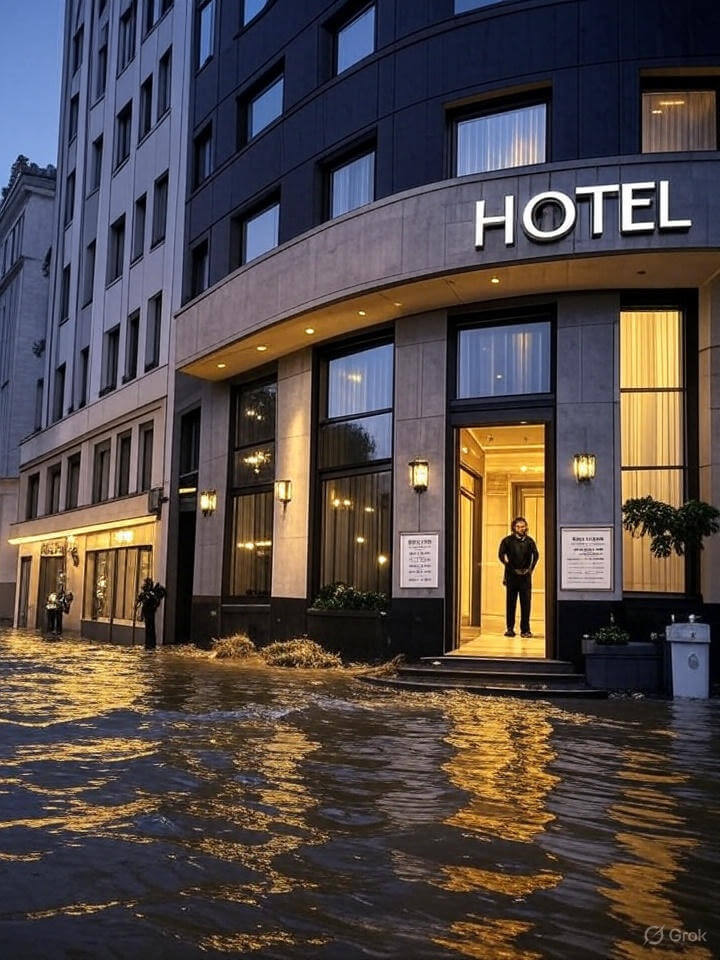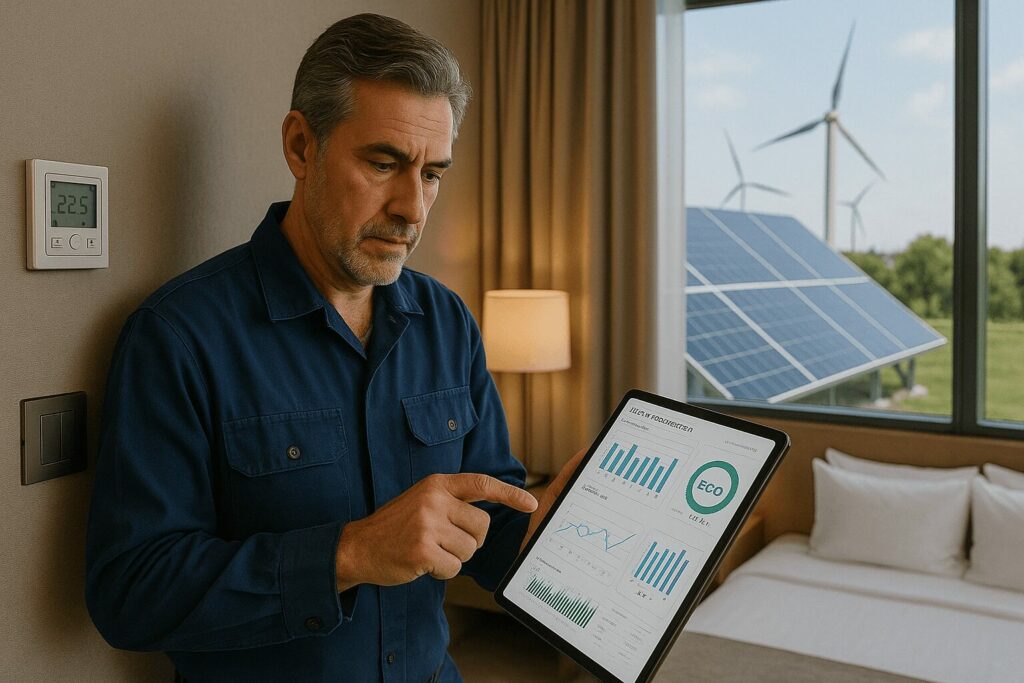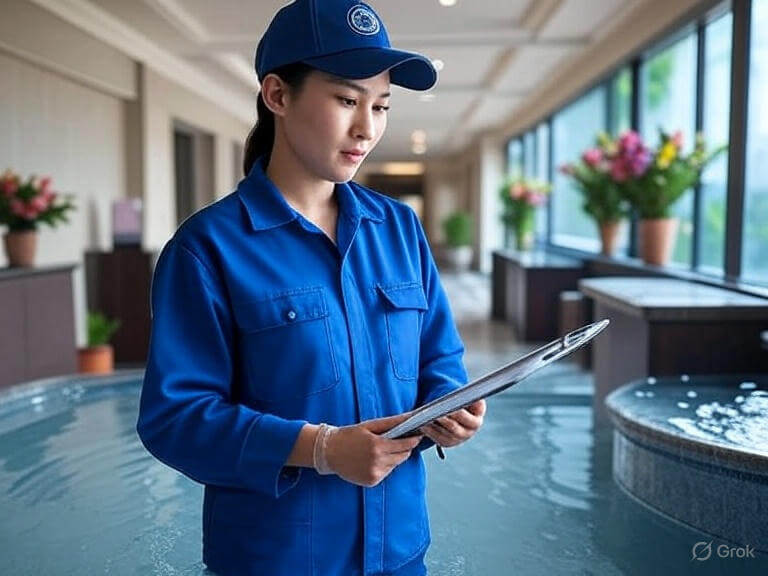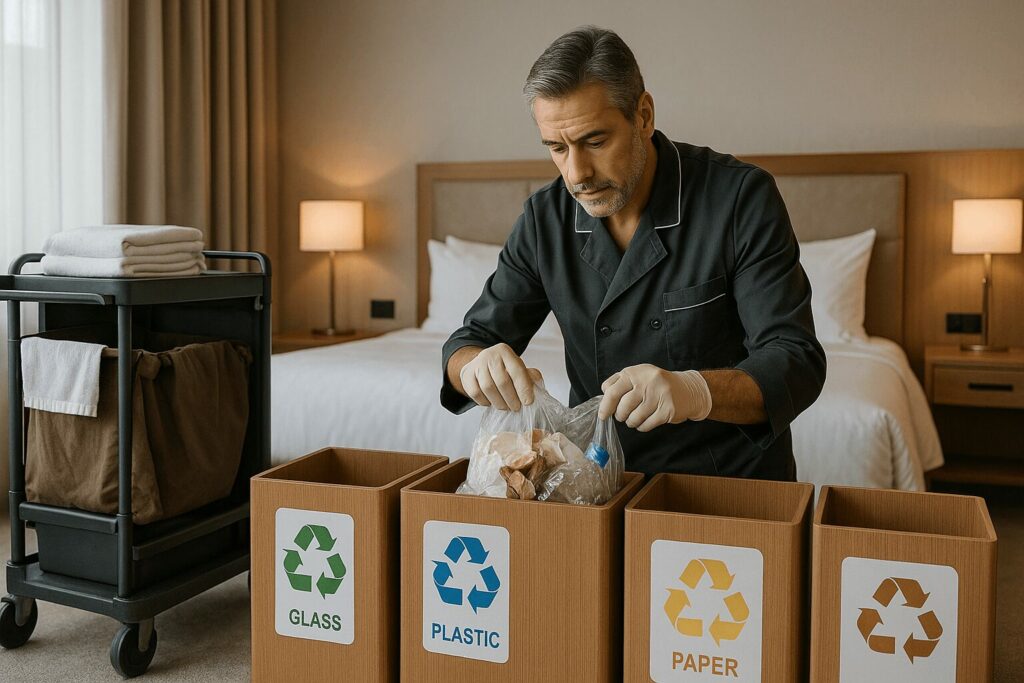
Sustainability in hospitality industry challenges and opportunities
Ever felt like going green in hospitality is like trying to move a mountain with a spoon? 🏔️🌿 This article unpacks sustainability in hospitality industry challenges and opportunities, from rising operational costs to innovative energy solutions, while cutting through the fluff of greenwashing. Spoiler: We’re exploring real strategies—like hotel water conservation and waste reduction—to turn eco-friendly challenges into business wins. Let’s make sustainable practices less “save the world” stress and more “smart move” for your bottom line. 💡
Sustainability in hospitality industry challenges and opportunities Article Takeaways
Sustainable hospitality faces key challenges—from high upfront costs and seasonal budget strains to climate risk denial and staff training gaps. However, opportunities abound: smart energy systems, water-saving tech, and waste reduction all drive ROI and guest loyalty. Hotels that prioritize real action over greenwashing can reduce costs by up to 30% while boosting reputation. Sustainability isn’t a burden—it’s a strategic asset.
Table of contents
- Financial and Operational Challenges in Hospitality Sustainability
- Climate Risk Recognition Gap in the Hotel Industry
- Energy Optimization and Renewable Energy Solutions
- Responsible Water Management in Hotels
- Waste Reduction and Management Strategies

Financial and Operational Challenges in Hospitality Sustainability
Hotels face big financial hurdles when going green 🤑. Upfront costs for eco-infrastructure like solar panels or water systems often scare owners. Even small upgrades? They add up. The W San Francisco spent $4,000 on water-saving tech but broke even in a year. Not all can stomach initial investments, though.
High-tech sustainability tools hit wallets hard 💸. Solar panels, energy-efficient appliances? They’ll set you back $100K–$250K. Big hotels absorb this easier than tiny boutique spots. Hilton Milan’s smart dishwashers? They cut costs long-term. Small hotels? They’ve got to play smarter with smaller, targeted upgrades first.
Seasonal shifts play havoc with eco-budgets 🌊. High season = sky-high energy bills. Low season = less revenue for green projects. Hilton’s Connected Room tech cuts energy use when rooms sit empty. Smart systems help, but hotels still struggle to balance fluctuating demand with steady sustainability goals.
Sustainability budgets get squeezed by seasonal madness. Smart sensors cut energy use during slow periods. Going renewable lowers long-term bills. 43% of travelers pay extra for eco-hotels—good news. But unpredictable occupancy means hotels walk a tightrope between green goals and cash flow.
- High initial investments 🚧 for sustainable infrastructure
- Operational costs 💸 tied to eco-friendly technologies
- Seasonal budget fluctuations 📉 affecting long-term sustainability
- Staff training gaps 🚧 in sustainable practices
Staff often drag their feet on green changes 🙄. Why? They don’t get why it matters or feel involved in decisions. Fear of extra work? Yep. The Société des Bains de Mer tackles this by making sustainability part of job reviews. Without team buy-in, even good eco-plans crash.
Training gaps? Huge. Staff might not know how to cut energy or waste. Example: only 19% of hotels discuss food waste at meetings. Hotel Weiss Kreuz fixed this by measuring trash together. Training programs need to teach real skills—not just handouts about recycling.
Luxury guests want eco-efforts invisible 🌟. They still expect fluffy towels and hot showers. Brune Poirson (ex-Accor) says true luxury means responsible sourcing, not sacrifice. 81% of 2021 travelers sought green stays. The trick? Make sustainability feel effortless, not preachy.
Short-term thinking kills long-term gains 🧠. Hotels stress about upfront costs over lifetime savings. Hotel Marcel’s $3/night energy cost vs. $15.50 average proves ROI works. But only 39% see non-compliance as risky. Calculating ROI needs to count reputation wins, not just dollars. As we could see, in term of Sustainability in the hospitality industry challenges and opportunities are often going together.

Climate Risk Recognition Gap in the Hotel Industry
Hotels often downplay climate risks while chasing daily profits 🌤️. European ski resorts lose 20 snow days per decade, and coastal properties face rising seas. The industry contributes 8-10% of global emissions but treats climate action as optional. Short-term thinking? Let’s call it what it is: a slow burn. 🔥
Guests demand sustainability, but hotels drag their feet 🔄. 73% of travelers prioritize eco-friendly stays, yet many hotels treat green practices as a checkbox. Accor’s Greet brand proves it’s possible to blend sustainability with luxury (source). The disconnect? Over 50% of hotels still lack clear strategies despite clear demand.
Extreme weather and rising seas threaten hotel foundations 🌊. 50% of coastal properties risk flooding, while mountain resorts rely on artificial snow. A 1.5°C temperature rise cuts hotel profits by 2-3%. The math is simple: ignore climate risks, lose your asset. 🏔️
Hotels move at a snail’s pace on sustainability ⏳. Only 39% of operators view non-compliance as a real risk. Accor and Okko Hotels show early integration works—lower costs, stronger reputation. The gap? Fear of guest pushback and upfront costs, but the future favors bold moves.
Ignoring sustainability = kissing profits goodbye 💸. Leaders cut costs by 30%, attract eco-travelers, and secure green financing. SENAC Brazil’s carbon neutrality slashed logistics costs while boosting reputation. 64% of travelers prioritize eco-hotels—lagging behind means empty rooms.
Greenwashing? More common than a Parisian bistro 🤭. 59% of guests doubt hotel sustainability claims. Example: hotels still replace towels daily despite reuse requests. Real action means measurable cuts in energy and waste, not just “eco” buzzwords on websites.
Executives don’t speak the same sustainability language 🗣️. Definitions vary, and investment analysis skills lag. Poor implementation—like confusing towel reuse with bad service—hurts guest experience. Training leaders on climate risks isn’t optional; it’s survival.
Hotels act when guests or costs force them 🤯. 66% want sustainability without comfort trade-offs. Hilton’s 43% water reduction since 2008 proves proactive wins. The shift? Use AI for HVAC maintenance, not reacting to crises. Smart moves beat band-aids.

Energy Optimization and Renewable Energy Solutions
Energy accounts for 60% of hotels’ carbon footprint and 6% of operating costs 💡. Heating, cooling, and lighting eat resources. The Radisson Blu slashed energy use 30% via smart systems. Solution? Balance costs with tech upgrades. Guests reward eco-efforts too—94% care about sustainability. Let’s decode what works. 🌍
First, all hotels brands and chains are committed to reduce their carbon footprint. However, Generals Managers can face the refusal of their owners to invest into new generation HVAC equipment, which are less greedy in energy compared with the previous generation of equipment. Therefore, hotels managers are caught between a rock and a hard place: reduce carbon footprint and propose solutions with an interesting and fast ROI. To do so without a heavy and painful financial investment, hotel water and energy optimization with no cost are the best solution. It allows to start slashing the utilities bills, and open the door to further discussions with the properties owners.
Automated systems slash HVAC use by 30%—Courtyard Hotel’s 39% cut proves it 🛠️. Sensors adjust power based on occupancy. Implementation hurdles? Upfront costs and integration challenges. But Deloitte’s case studies show $1B saved industry-wide through smart energy management (source). Automation isn’t just green—it’s profitable. 💸
Solar pays off long-term 🌞. Wynn Resorts expects 20% energy savings over 10 years. Hotel Marcel’s 1,000+ panels drop energy costs to $3/room/night. Passive House-certified builds cut energy use 75%. Solar’s ROI varies, but eco-conscious travelers boost occupancy—making it a dual win for wallets and the planet. 🏨
Wind works for coastal or mountain hotels 🌬️. Hôtel de France’s 9MW wind project in France proves viability. Small-scale turbines (5kW) fit rooftops. Best for high-wind areas like coastal resorts. Initial costs? Steep. ROI? Up to 2 years for micro-turbines. Think vertical-axis models for urban hotels—quiet and efficient. ⚙️
Biofuels cut fossil fuel reliance 🔥. Biomass cogeneration plants run on wood chips or pellets. Ethanol fireplaces in lobbies cut emissions. These systems produce heat, power, and cooling—ideal for 24/7 operations. Example: Ethanol fireplaces add ambiance without the smoke. Practical, but local fuel access matters. 🌲
Fuel cells power hotels cleanly 🧪. Kawasaki Hotel runs 100% on hydrogen from waste. Radisson Blu Frankfurt hits 80% electricity needs with fuel cells, cutting 600 tons of CO2 yearly. Efficiency? 80% via combined heat and power. Perfect for urban hotels needing steady energy without noise or pollution. Silent sustainability wins. 🌆
Retrofits pay fast. Radisson Blu slashed gas use 41% with smart HVAC monitoring. LED upgrades and envelope improvements offer quick ROI. Focus on high-impact zones first—HVAC alone eats 50% of energy. Phase upgrades to spread costs. Example: Isolate heating networks for 15% savings before solar. ✅
Buy green energy to shrink footprints 🌿. 44% of global electricity could be renewable by 2040 (IEA). Certifications like LEED or EU Ecolabel build trust. Partner with providers offering 100% renewable contracts. Example: Lungarno Collection’s DCA certification proves luxury and sustainability coexist. Green power isn’t just ethical—it’s economical. 🏅
- Smart sensors cut HVAC costs by 30% 🌡️
- LED retrofits save 50% in lighting energy 💡
- Passive House standards slash energy use 75% 🛠️
- Hydrogen fuel cells eliminate grid dependency 🧪

Responsible Water Management in Hotels
Hotels guzzle 300 liters water/guest/day, with laundry, pools, and spas leading consumption 🚰. In drought-prone areas like Pyrénées-Orientales, in France, hotels face urgent water management challenges. Luxury amenities often clash with conservation—think endless showers vs. dwindling resources. It’s a balancing act between guest comfort and planetary responsibility.
Smart metering cuts water use up to 53% by catching leaks fast 🛠️. Solar Hôtel slashed consumption by 50% using meters for real-time tracking. Granular data per equipment helps target waste hotspots. But installing detailed systems costs money—where’s the ROI? Time to start plugging those invisible leaks.
Low-flow fixtures slash water use by 50% without guest grumbles 🚰. EPA-certified showerheads at 1.28 gallons/minute prove efficiency. EcoFlow thermostats limit flow to 12L/minute while maintaining pressure. Guests care about sustainability—87% reuse towels when asked nicely. Perception? It’s all about framing eco-choice as premium, not punishment.
Staff habits shape water use big—dripping taps waste 120L/day 🚨. Training programs reduce laundry’s 10M m³/day global thirst. Hands-on sessions at hotels like Hotel Weiss Kreuz teach leak detection and efficient cleaning. When teams grasp their role in conservation, small changes create massive impact. Education isn’t optional—it’s essential.
Guests respond to clear messaging over guilt trips 📣. Visual cues for towel reuse work better than generic signs. Hôtel Colony’s eco-campaign boosted compliance by almost double. Incentives like loyalty points for water-saving choices? Genius. When guests feel part of the solution, sustainability becomes a shared adventure—not a chore.
Greywater systems recycle 60% of wastewater for landscaping and toilets ♻️. Novotel Itu saved 4.4M liters in 2023 via treated shower water. Challenges? Infrastructure costs and local regulations. But when systems pay back through lower bills, the math makes sense. Imagine turning yesterday’s shower into tomorrow’s garden irrigation—circular thinking in action.
Rainwater harvesters thrive in wetter climates 🌧️. Scarlet Hotel uses it for irrigation, while Keemala achieves full independence in Thailand. Drier regions need bigger tanks but still cut costs. Cooling towers guzzle 1 gallon/sq.ft/summer month—rainwater eases that load. It’s not just about saving money; it’s about adapting to our changing climate.
- Greywater recovery systems ♻️ for non-potable uses
- Low-flow fixtures 🚰 maintaining pressure while reducing water
- Valiryo Body Dryer 💨 eliminating towel usage
- LuniShower technology 💧 saving 2M liters/year for 100-room hotels

Waste Reduction and Management Strategies
Hotels generate 570kg of waste per room yearly—44-64 tons annually depending on restaurant operations 🗑️. Upscale properties hit 200 tons/year. Food waste alone makes up 12% of European hotel trash. The industry’s waste problem isn’t just an environmental crisis—it’s a financial leak. Time to plug the gaps and to start reduce food waste in restaurants .
Single-use plastics flood hotel bathrooms and dining areas 🚫🧴. Water bottles, shampoo sachets, and straws pile up fast. ITC Hotels nixed 500,000 plastic items annually by switching to bulk dispensers. Araiya’s internal bottling system saves 115,000 plastic bottles yearly. The solution? Replace disposables with durable alternatives—no rocket science required.
Simple bins beat fancy designs when recycling works. Clear signage in guest corridors and staff zones? Golden. But staff compliance? Tricky. « Pay-as-you-throw » systems reward proper sorting. Example: staff bonuses for hitting recycling targets. Training beats punishment—turn waste reduction into a team sport. 🎯
Composting turns kitchen scraps into garden gold 🌿. Off-site collection works for small hotels. Larger properties use dehydrators—like a Paris hotel paying €0.05/cover for weekly 120L collections. Over 100 covers daily? On-site composting makes sense. Train staff to separate pre-consumer waste—it’s cheaper than landfill fees.
Food donations protect profits and planet 🍽️. U.S. law shields hotels giving surplus to food banks. France’s Banques Alimentaires rescue 80,383 tonnes yearly. Hotels like Domaine de Manville compost scraps for kitchen gardens. Structure programs with trained staff handling donations—turn waste into community wins without legal headaches.
- Smart waste audits cut landfill contributions 📉
- Compostable packaging replaces plastic in food service 🌱
- Valiryo Body Dryer cuts towel usage 70% 💨
- AI-powered waste tracking reduces sorting errors 🧠
Hotel waste audits identify 43% recyclable materials. Staff training closes 29% of sorting errors. Bulk dispensers slash 80% of single-use plastic. The numbers don’t lie—smart waste management pays. Now, who’s ready to transform trash into treasure? 💎
Sustainability in the hospitality industry challenges and opportunities is a wide topic. The hospitality sector’s journey toward sustainability isn’t without hurdles—high costs and climate risks keep many up at night. 🌍 Yet, opportunities like energy optimization and waste reduction aren’t just eco-friendly fixes—they’re smart business moves. Embrace gradual changes today, and your hotel could lead tomorrow’s green revolution, where profitability and planetary health share the same vision. ♻️💧
Q / A about sustainability in the hospitality industry challenges and opportunities
What is hospitality sustainability?
Alright, let’s cut through the jargon. Hospitality sustainability is all about integrating eco-friendly and socially responsible practices into every nook and cranny of hotel operations. Think of it as a smart way to offer an exceptional guest experience while ensuring we’re being kind to our planet and the communities around us. It’s not just about saving the world; it’s about making sure your business thrives in the long-term economic viability sense too. 🌍💡 Essentially, it means finding clever ways to reduce your carbon footprint, conserve vital resources like water, and manage waste more effectively. It also involves responsible sourcing and making a positive impact on communities. When done right, it helps cut operational costs, boosts your brand reputation, and attracts those savvy travelers who genuinely care. It’s a win-win, really. 🌿💸
What are sustainability’s three pillars?
When we talk about sustainability, we’re building on three fundamental pillars: the Environmental, Social, and Economic. Think of them as the sturdy legs of a tripod – you really need all three for stability. The Environmental pillar focuses on the planet; it’s about reducing your impact, conserving resources, and mitigating climate risks. This means everything from cutting energy use to managing waste and water responsibly. 💧♻️ Then there’s the Social pillar, which is all about the people. This involves ensuring the well-being of employees and communities, promoting fair labor practices, diversity, and supporting local initiatives. Finally, the Economic pillar is about profit, but sustainably. It’s about ensuring long-term financial viability through efficiency, innovation, and smart investments that reduce costs and attract eco-conscious customers. It’s the balance that keeps the whole operation running smoothly. 💰🤝
Primary focus of sustainable hospitality?
The primary focus of sustainable hospitality is a strategic balancing act: it’s about reducing environmental footprint while simultaneously enhancing social responsibility and ensuring long-term economic viability. In simple terms, it’s not just a feel-good initiative; it’s a strategic imperative for modern hotels. The industry, being a significant consumer of resources, needs to actively mitigate its impact. 🏔️ This means prioritizing operational efficiency through smart energy and water management, embracing waste reduction, and sourcing responsibly. It also means fostering positive community relations and ensuring ethical labor practices. Ultimately, the goal is to transform environmental challenges into opportunities that boost brand reputation, increase guest loyalty, and secure a more resilient future for the business. 💡🌍
What is sustainable hospitality’s future?
The future of sustainable hospitality isn’t just a trend; it’s becoming the standard practice. We’re looking at a deep transformation where hotels are actively working towards significant carbon footprint reduction, aiming for ambitious goals like 90% by 2050. This shift is driven by increasing guest expectations—travelers are actively seeking out eco-friendly stays—and the clear economic advantages that come with it, like lower energy and waste costs. ♻️ Expect to see widespread adoption of innovative solutions such as renewable energy sources, advanced water conservation techniques, and a strong move towards a circular economy to minimize waste. Smart technology will play a crucial role in optimizing resource use and enhancing the guest experience without compromising the planet. It’s about making sustainability an integral part of the business model, leading to more resilient operations and deeper community engagement. 🌟📈
What is ESG in hospitality?
ESG in hospitality stands for Environmental, Social, and Governance. It’s a holistic framework that helps hotels measure and manage their impact across these three critical areas. Think of it as a comprehensive report card for how well a hotel is doing its part beyond just making a profit. 📊 The Environmental aspect covers things like reducing carbon emissions, managing water, and minimizing waste. Social focuses on how a hotel treats its employees, engages with local communities, and ensures diversity and inclusion. And Governance is all about the transparency, ethics, and accountability of the hotel’s leadership and operations. Embracing ESG isn’t just good for the planet; it’s increasingly crucial for investor appeal, risk management, and boosting overall brand value. 🌿🤝
